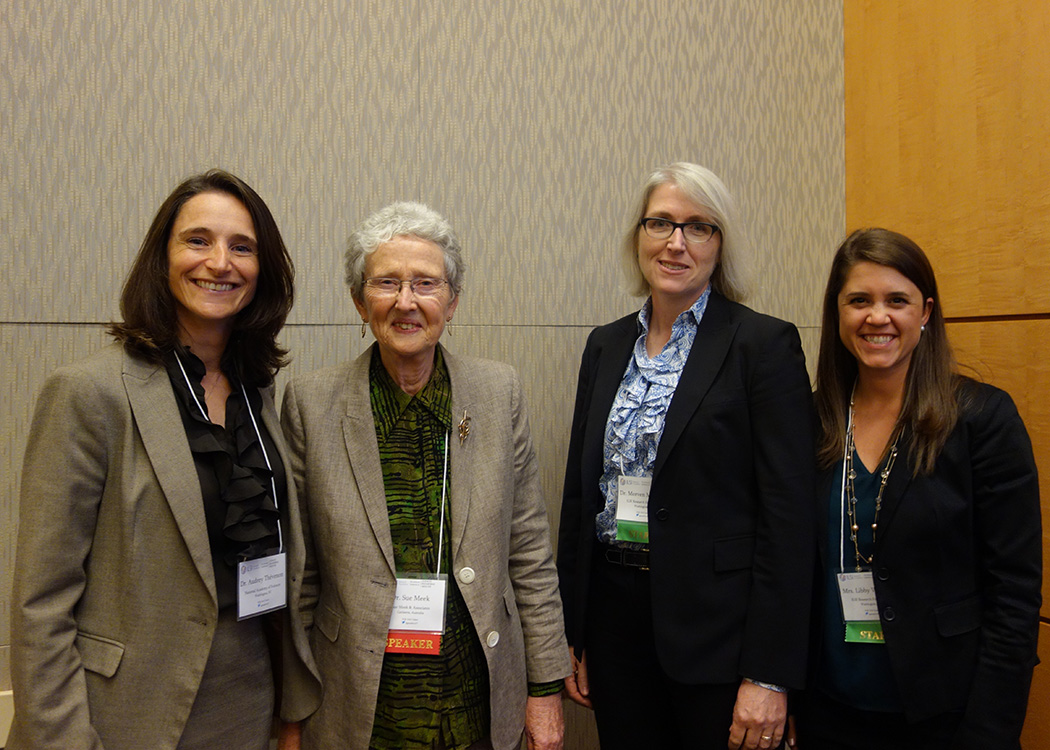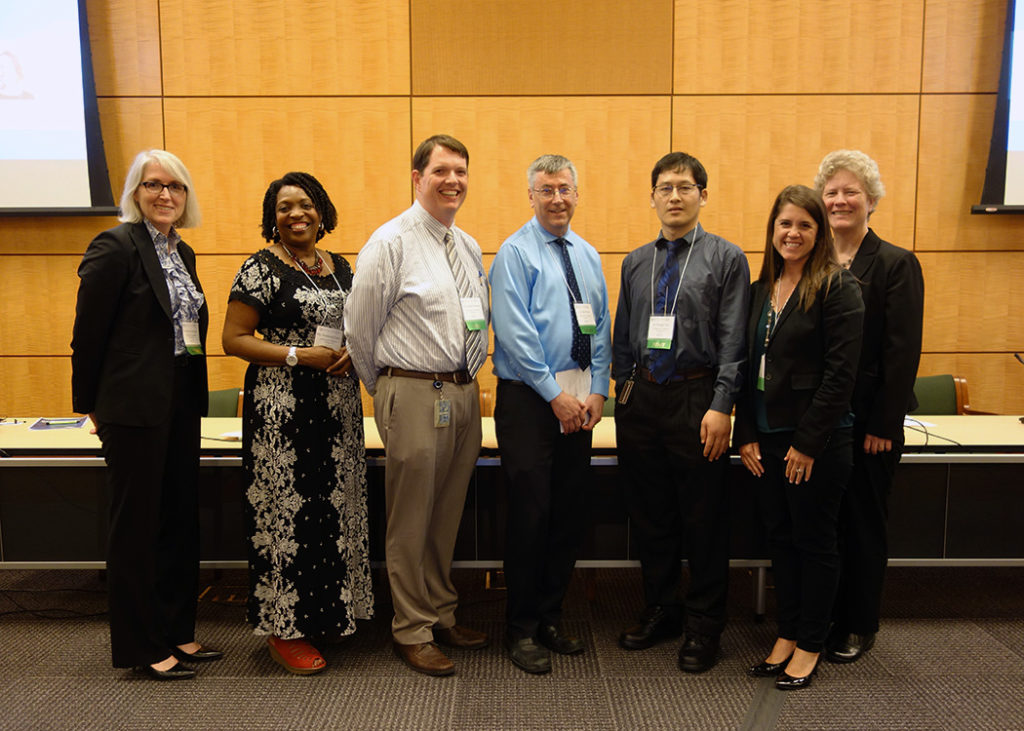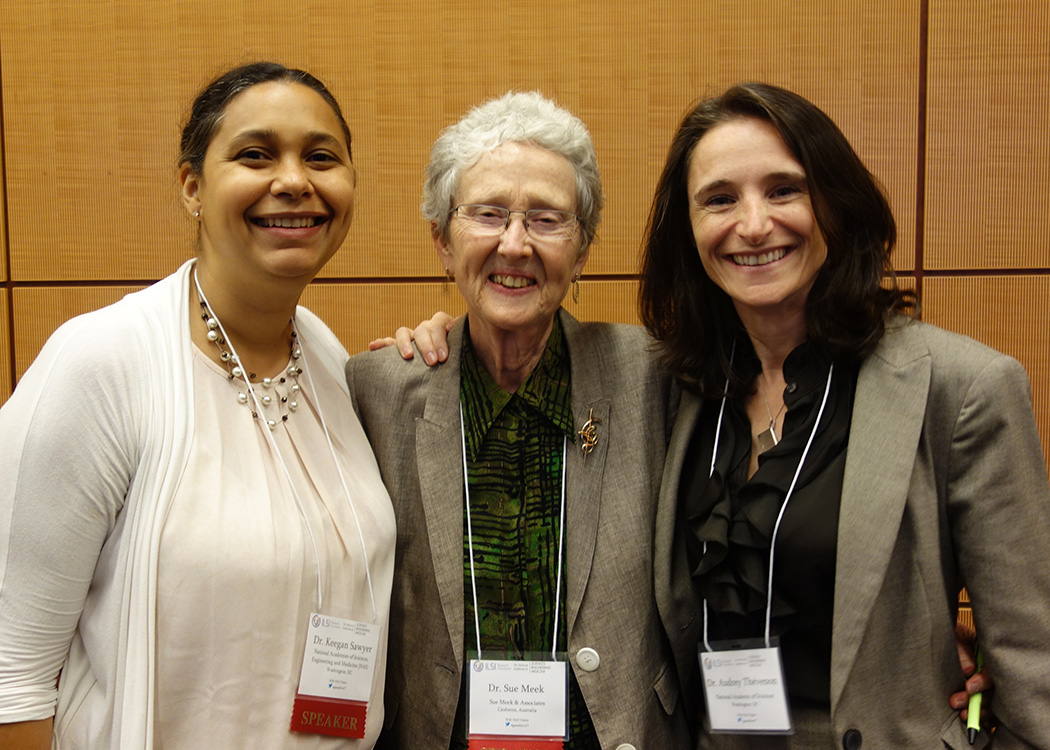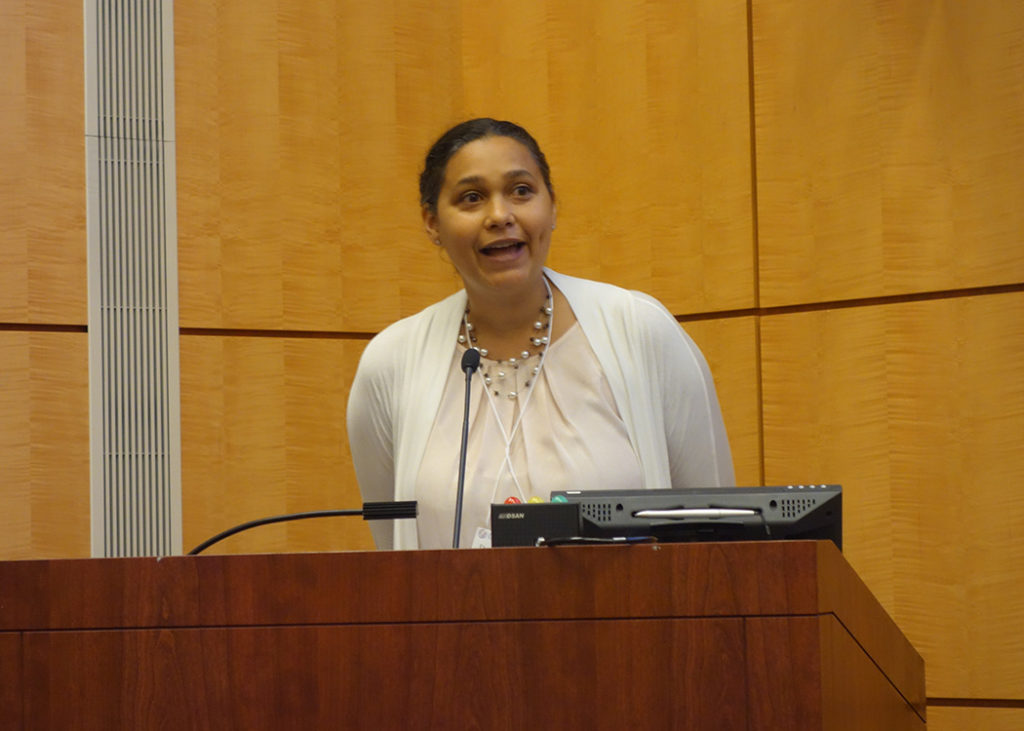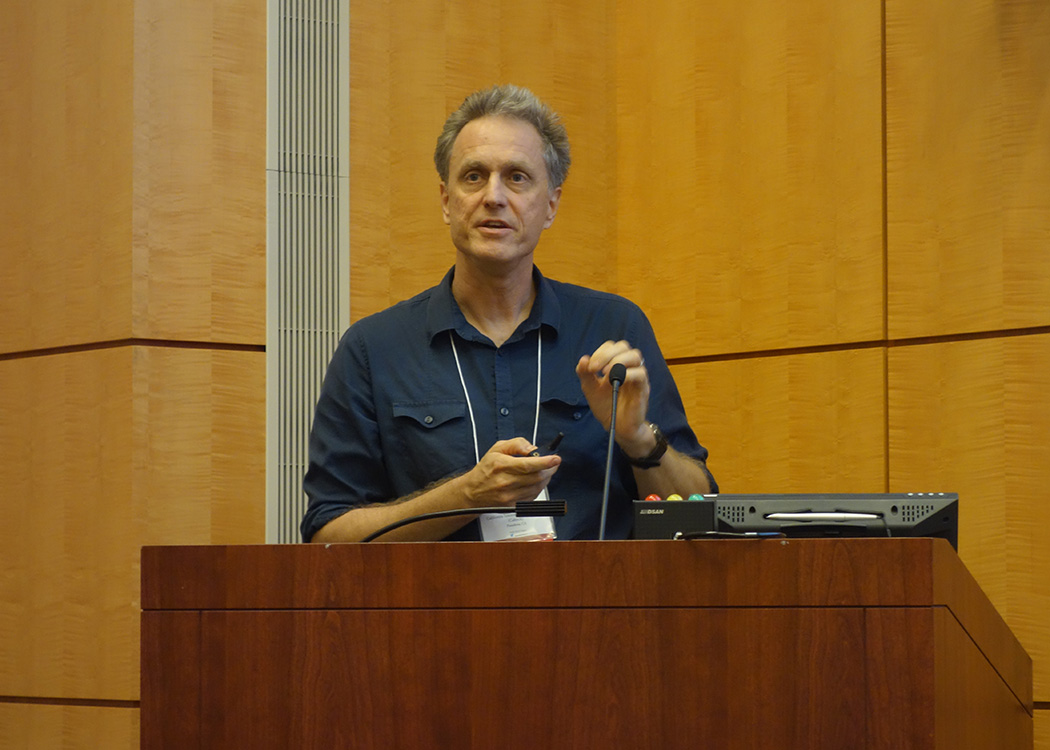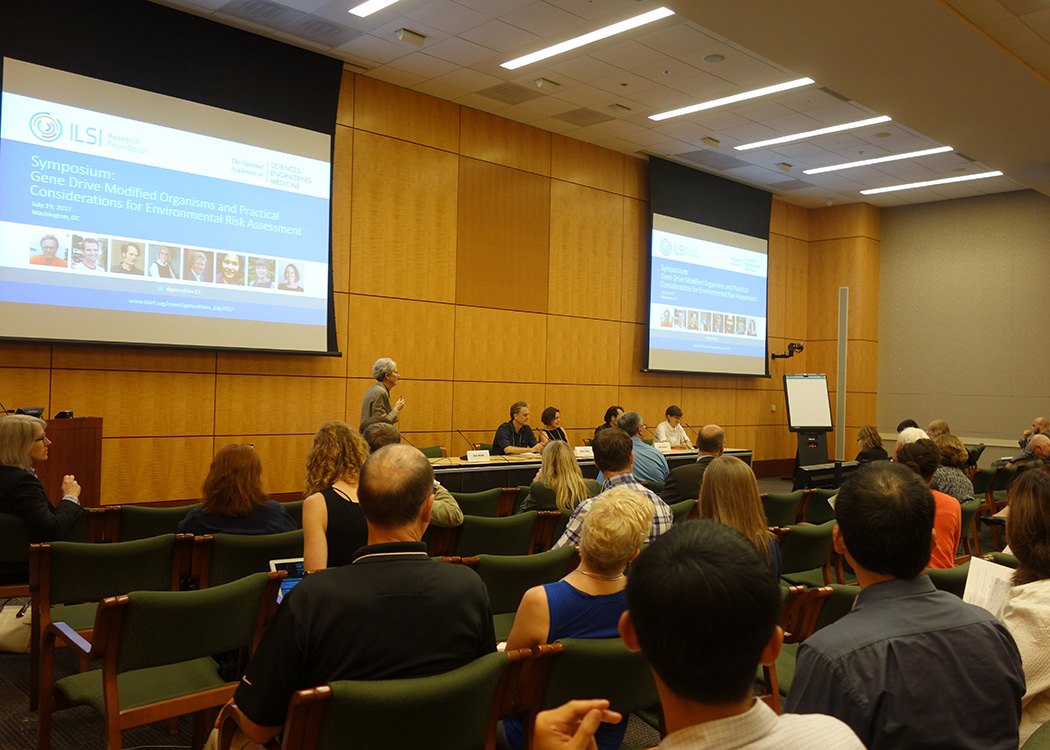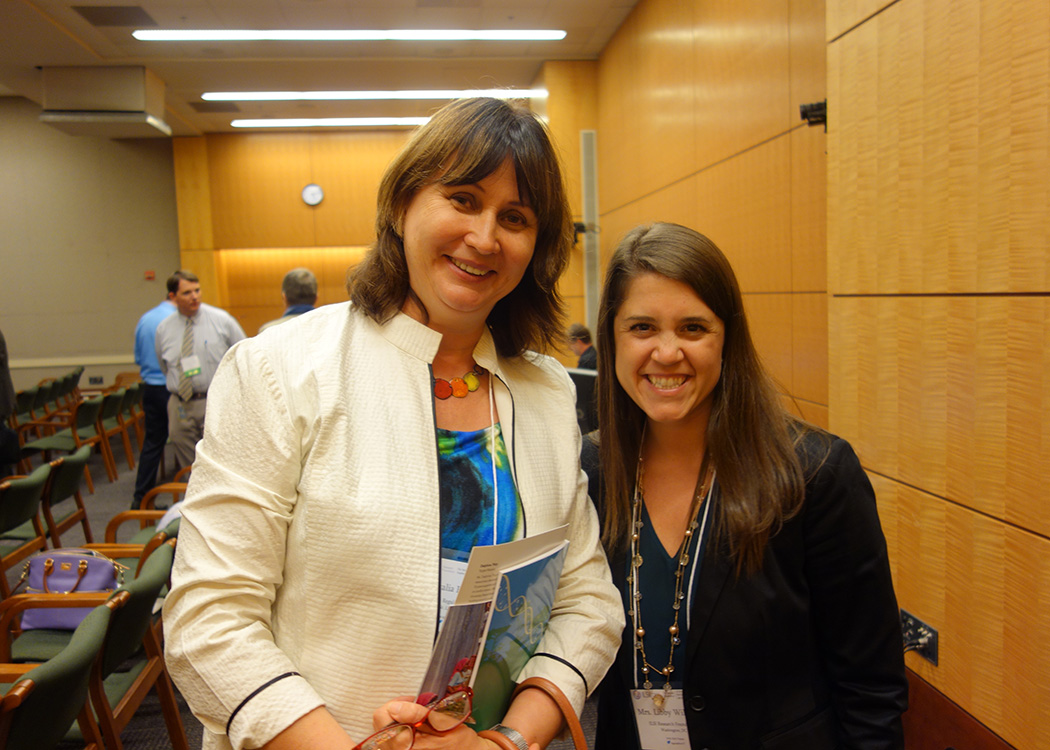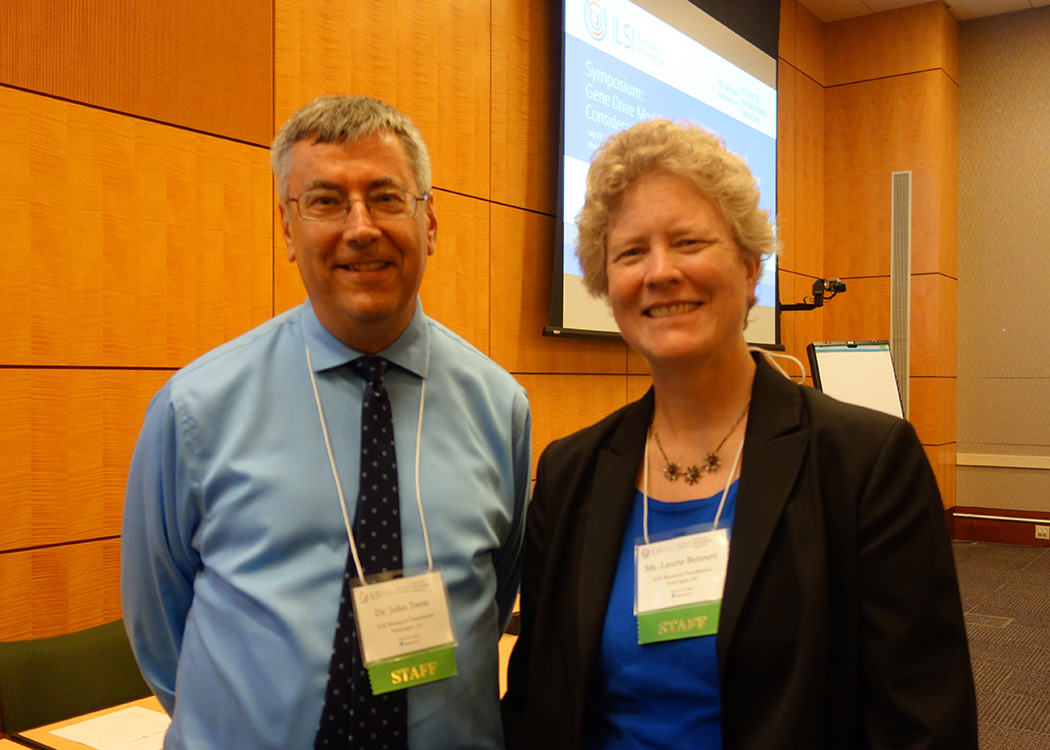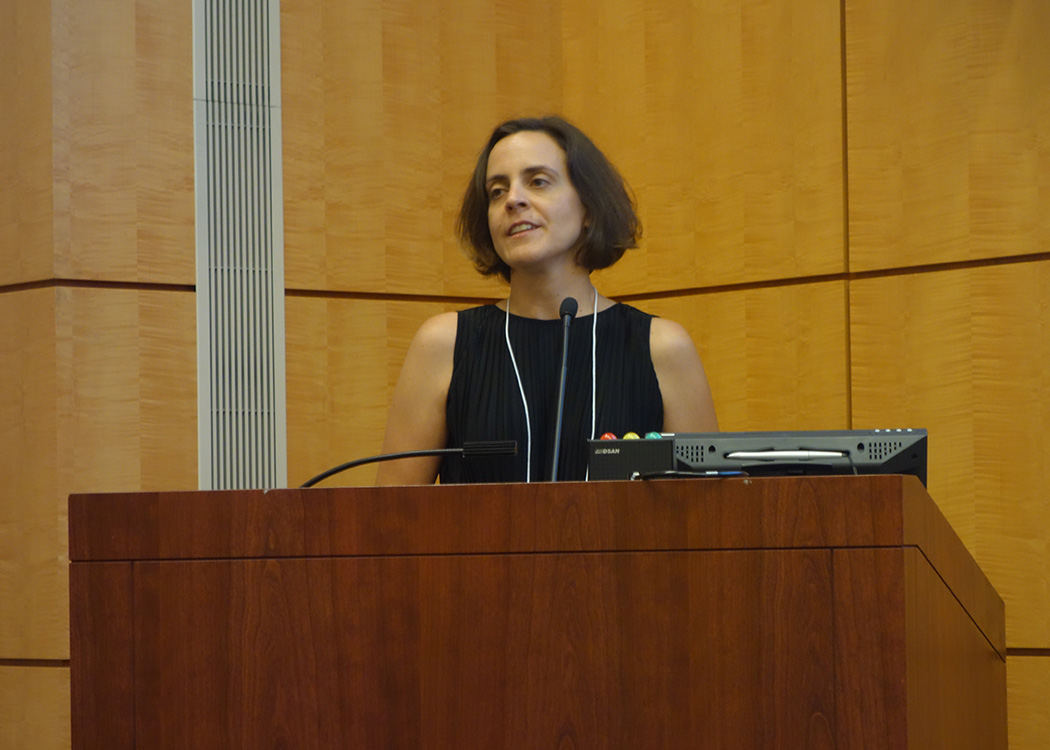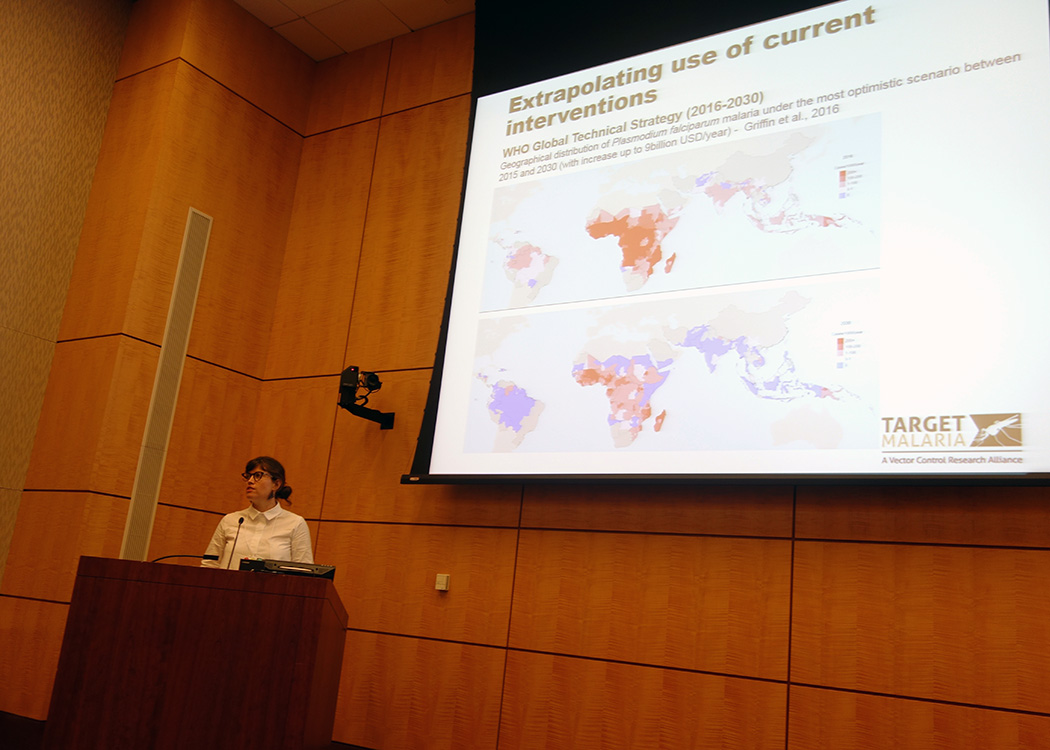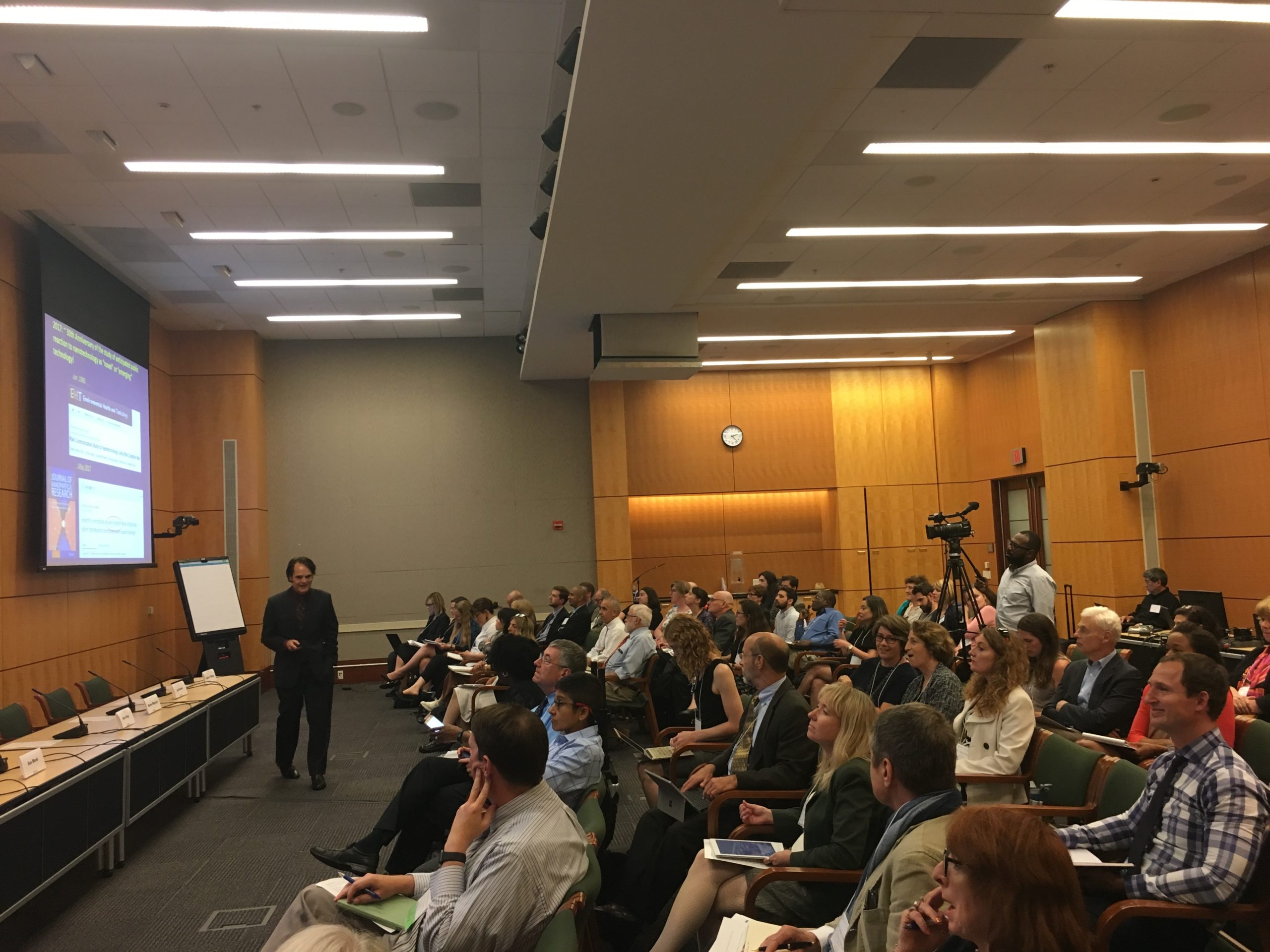Symposium: Gene Drive Modified Organisms and Practical Considerations for Environmental Risk Assessments
-
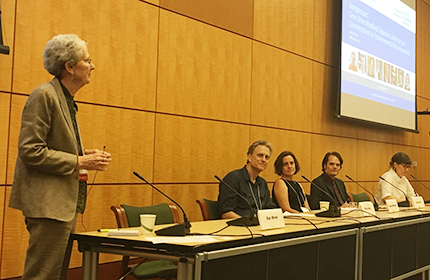
July 19, 2017
1:00 pm - 5:00 pmNational Academies of Sciences, Engineering, and Medicine, Keck Center
Washington, DC, USA
The Agriculture & Food Systems Institute and the National Academies of Sciences, Engineering, and Medicine (NASEM) co-organized the symposium “Gene Drive Modified Organisms and Practical Considerations for Environmental Risk Assessment”, held at the National Academy of Sciences’ Keck Center, Washington DC on July 19, 2017. This symposium built on the excellent work achieved with the 2016 NASEM report Gene Drives on the Horizon and further explored how to frame and undertake environmental risk assessments of gene drive organisms in a way that will usefully inform decision-making related to their potential release.
Speakers
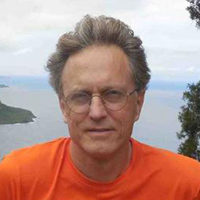
Bruce Hay, Ph.D.
California Institute of Technology (Caltech)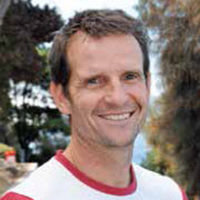
Keith Hayes, Ph.D.
Commonwealth Scientific and Industrial Research Organisation (CSIRO)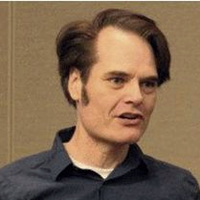
Dan Kahan, J.D.
Yale Law School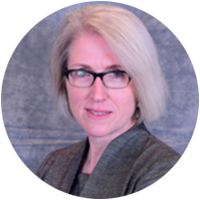
Morven McLean, Ph.D.
Agriculture & Food Systems Institute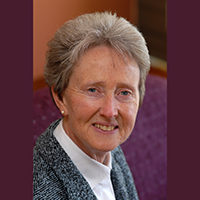
Sue Meek, Ph.D.
Sue Meek & Associates and The Australian National University (Moderator)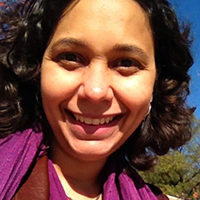
Keegan Sawyer, Ph.D.
National Academies of Sciences, Engineering, and Medicine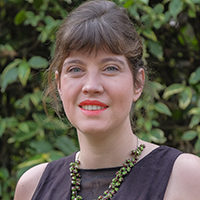
Delphine Thizy
Target Malaria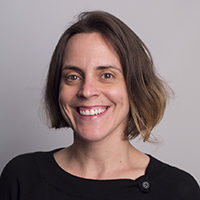
Renee Wegrzyn, Ph.D.
Defense Advanced Research Projects Agency (DARPA)Speaker Bios
Bruce Hay, Ph.D.
Dr. Bruce A. Hay has been a Professor of Biology and Biological Engineering at the California Institute of Technology since 1996. His lab has two general areas of focus. The first revolves around the study programmed cell death and neurodegenerative diseases. The second seeks to understand and manipulate the composition and fate of genomes within cells and populations of individuals. At the level of the cell the lab works to understand and enhance the process of mitochondrial DNA quality control, which removes pathogenic mutant mitochondrial genomes that accumulate during normal aging and contribute to a number of age-related diseases. At the level of populations the lab works to develop technologies to control the composition and fate of wild populations. This work has four overall aims: 1) to bring about reproductive isolation (speciation) between populations of plants or animals that otherwise freely interbreed; 2) to engineer the genetics of invasive or pest insect populations so that they drive themselves to local extinction; 3) to drive genes into wild insect populations (population replacement) such that all individuals express a trait of interest, such as inability to transmit a mosquito-borne disease; 4) to bring about long-term infertility in wild (or feral) animals through vectored expression of antibodies or other proteins that inhibit key steps in reproduction.
Highlights of this work include the labs 2007 development of the first engineered gene drive mechanism, synthetic Medea selfish genetic elements that drive population replacement in insects. In subsequent work the lab had gone on to develop several other gene drive mechanisms designed to bring about local and reversible population replacement. In 2015 the lab reported the first development of a long term/lifetime single shot contraceptive utilizing gene therapy based approaches. In 2016 they showed for the first time that pathogenic mitochondrial DNA mutations could be eliminated from adult tissues through stimulation of several different signaling pathways.
Keith Hayes, Ph.D.
Dr. Keith Hayes started his research career with the Institute of Offshore Engineering at Heriot-Watt University, in 1993. Here he helped to develop quantitative risk assessment techniques for the abandonment and disposal of offshore platforms, and for demersal trawl interactions with subsea well heads and pipelines.
Dr. Hayes joined the Commonwealth Science and Industrial Research Organisation (CSIRO) in 1997 and completed his Ph.D. in Quantitative Ecological Risk Assessment in 2000. He is currently a senior research scientist leading CSIRO’s environmental risk assessment team in the Hobart laboratories. His research interests focus on the key steps in quantitative environmental risk assessment: hazard analysis, probabilistic risk calculations, uncertainty analysis and monitoring.
Dr. Hayes and his team are currently conducting a probabilistic risk assessment of a proposal for contained field trials of dominantly sexually sterile male mosquitoes in Burkina Faso, and a systematic analysis of the hazards associated with the use of CRISPR/Cas9 to control mouse populations.
Dan Kahan, J.D.
Dan Kahan is the Elizabeth K. Dollard Professor of Law and Professor of Psychology at Yale Law School. He is a member of the Cultural Cognition Project, an interdisciplinary team of scholars who use empirical methods to examine the impact of group values on perceptions of risk and science communication. In studies funded by the National Science Foundation, Professor Kahan and his collaborators have investigated public dissensus over climate change, public reactions to emerging technologies, and public understandings of scientific consensus across disputed issues. Articles featuring the Project’s studies have appeared in a variety of peer-reviewed scholarly journals including the Journal of Risk Research, Judgment and Decision Making, Nature Climate Change, Science, and Nature. The Project’s current focus is on a field research to integrate insights from the science of science communication into the craft of professional science communicators in various domains, including democratic decision making, education, and popular engagement with science.
Professor Kahan is a Senior Fellow at the National Center for Science and Civic Engagement, a member of the American Academy of Arts and Sciences.
Morven A. McLean, Ph.D.
Dr. Morven A. McLean is the Executive Director of the non-profit Agriculture & Food Systems Institute, where she works with a dedicated team on multi-sectoral, interdisciplinary scientific and capacity building programs that span agriculture, nutrition and the environment.
Dr. McLean first joined the Agriculture & Food Systems Institute in in 2009 as Director of the Center for Environmental Risk Assessment, and in 2013 was additionally appointed lead for sustainable agriculture and nutrition security across the ILSI organization internationally. She has held the position of Chief of Canada’s Plant Biotechnology Office, the federal regulatory authority for the assessment and release of genetically modified plants, and was President of AGBIOS, a consultancy that works internationally with governments, non-governmental organizations, and the public and private sectors on issues of policy and regulation pertaining to genetically modified foods, crops, and forest tree species. Dr. McLean has served as a technical expert on biotechnology risk assessment, regulation and policy for many organizations, including the Food and Agriculture Organization, the World Bank, the United States Agency for International Development, the United National Environmental Program and the Secretariat to the Convention on Biological Diversity, as well as many national governments.
Dr. McLean received her B.Sc. (Agriculture) from McGill University, M.Sc. in environmental biology from the University of Guelph, and Ph.D. in molecular plant virology from the University of British Columbia. She completed her post-doctoral training with Agriculture and Agri-food Canada’s Vancouver Research Station.
Sue Meek, Ph.D.
Dr. Sue Meek has over 30 years of experience working in a variety of capacities at the interface of industry, academic, government and non-government entities to promote awareness and understanding of science and technology (S&T), and the formulation of policies and programs to stimulate the conduct and appropriate application of research and development (R&D).
She is currently the Principal of Sue Meek & Associates which aims to apply her accumulated experience in science communication, advocacy and policy development, and expertise in research administration, commercialisation and regulation to the benefit of institutions, organisations and the community.
Between May 2008 and July 2016 she was the Chief Executive of the Australian Academy of Science and was previously Australia’s inaugural Gene Technology Regulator from December 2001. The latter statutory appointment was established by the Australian Government to administer the national regulatory system for the development and use of genetically modified organisms. Prior to this Sue held various senior State Government positions where she was responsible for the development and implementation of policies on science and technology and public sector intellectual property management, and the administration of grant programs to support innovation and to develop research capability. In the industry sphere, Dr Meek has principally been involved with the establishment of biologically-based business ventures.
Dr. Meek is an Honorary Professor at The Australian National University (ANU) and has a Ph.D. in marine biology; an M.Sc. in oceanography; and a B.Sc. (Hons.) in microbiology. She is a Fellow of the Australian Academy of Technology and Engineering and of the Australian Institute of Company Directors, a Director of Bioplatforms Australia Ltd., and a member of the Agriculture & Food Systems Institute Board of Trustees and the ANU’s Centre for Personalised Immunology Advisory Board. In 2014, she was appointed an Officer of the Order of Australia for distinguished services to science.
Keegan Sawyer, Ph.D.
Dr. Keegan Sawyer is a Senior Program Officer of the Board on Life Sciences at the US National Academies of Sciences, Engineering, and Medicine. Her work addresses a wide range of research, policy, and communication questions across the broad spectrum of life science disciplines. She has special interest in the interplay of environmental conditions and human health, ecosystem health, and public engagement in science. Dr. Sawyer is co-lead of the National Academies’ Standing Committee on Emerging Science for Environmental Health Decisions. She recently served as the Project Director for the Roundtable on Public Interfaces of the Life Sciences and Project Director of the Committee on Gene Drives Research in Non-Human Organisms: Recommendations for Responsible Conduct. She is committed to fostering discussions about research infrastructure, collaborative environments, and public engagement in science to support a healthier people and planet. Dr. Sawyer holds a B.S. in environmental biology from University of California Davis and an M.S. and Ph.D. in environmental sciences and engineering from the University of North Carolina Gillings School of Public Health.
Delphine Thizy
Ms. Delphine Thizy is the Stakeholder Engagement Manager of Target Malaria, a non-for-profit consortium of researchers developing an innovating vector control approach to save million of lives from malaria. She has over 10 years experience in the field of stakeholder engagement in lower-income countries, with a particular attention on conflict drivers. After receiving her Masters Degree in development studies and project management from the University Pierre Mendes France (Grenoble, France), she worked in advocacy for Palestinian farmers’ rights before holding several positions within PlaNet Finance in the Middle East and South Asia. There she was responsible for technical assistance to microfinance institutions in post-conflict countries as well as leading a team for capacity strengthening of various civil society groups.
Afterwards she joined a consultancy company, Channel Research, specialising on social impact of projects. In that role, she conducted a number of project evaluations in the field of humanitarian aid and development for a variety of donors and organisations – including the European Commission, members of the Red Cross and Red Crescent Movement and private foundations. After creating her own consultancy company, she specialised in social performance and stakeholder engagement for infrastructure and extractive industries. She led several teams for large social impact assessments across Africa.
Since 2014, she became the Stakeholder Engagement Manager of Target Malaria and works with a team in Mali, Uganda and Burkina Faso to gain public acceptance for this vector control technology. She also engages at international level with key stakeholders of the fight against malaria.
Renee Wegrzyn, Ph.D.
Dr. Renee Wegrzyn joined DARPA as a Program Manager in 2016. She is interested in applying the tools of synthetic biology to support biosecurity and outpace infectious disease. She is the program manager for the Living Foundries and Safe Genes programs. Living Foundries seeks to transform biology into an engineering practice by developing the tools, technologies, methodologies, and infrastructure to increase the speed of the biological design-build-test-learn cycle while significantly decreasing the cost and expanding the complexity of systems that can be engineered. Safe Genes aims to deliver novel biological capabilities to facilitate the safe and expedient pursuit of advanced genome editing applications, while also providing the tools and methodologies to mitigate the risk of unintentional consequences or intentional misuse of these technologies.
Prior to joining DARPA as a PM, Dr. Wegrzyn was a Senior Lead Biotechnologist at Booz Allen Hamilton, where she led a team that provided scientific and strategic support in the areas of biodefense, biosecurity, disruptive technologies, emerging infectious disease, neuromodulation, and synthetic biology to DARPA and other federal and private institutions. She is a former fellow and active mentor for the University of Pittsburgh Medical Center’s Center for Health Security “Emerging Leaders in Biosecurity” initiative. Dr. Wegrzyn also led research and development teams in the biotech industry focused on the development of multiplex immunoassays and peptide-based disease diagnostics.
Dr. Wegrzyn holds Doctor of Philosophy and Bachelor of Science degrees in Applied Biology from the Georgia Institute of Technology, with an undergraduate minor in Bioengineering. She completed her postdoctoral training as an Alexander von Humboldt Fellow in Heidelberg, Germany.
Agenda
We are excited to announce a dynamic line-up of speakers for Gene Drive Modified Organisms and Practical Considerations for Environmental Risk Assessments. Download the agenda in PDF format here.
1:00 am
Welcome and Introductions
Keegan Sawyer, Ph.D.
National Academies of Sciences, Engineering, and Medicine
Morven McLean, Ph.D.
Agriculture & Food Systems Institute
1:15 am
Setting the context for the symposium
Sue Meek, Ph.D.
Sue Meek & Associates and The Australian National University
1:30 am
Engineering local and reversible gene drive
Bruce Hay, Ph.D.
California Institute of Technology (Caltech)
1:55 am
Setting a safe course for genome editing research
Renee Wegrzyn, Ph.D.
Defense Advanced Research Projects Agency (DARPA)
2:20 am
The role of experts, experiments and data in moving gene drive risk assessment from theory to practice
Keith Hayes, Ph.D.
Commonwealth Scientific and Industrial Research Organisation (CSIRO)
2:45 am
Forecasting new technology risk perceptions: Are we there yet?
Dan Kahan, J.D.
Yale Law School
3:15 am
Integrating environmental risk assessment and stakeholder engagement: case study
Delphine Thizy
Target Malaria
3:35 am
Break
4:00 am
Panel Discussion and Q&A with Presenters
Moderator: Sue Meek
4:50 am
Summary Remarks
Sue Meek
5:00 am
Adjourn
Media Coverage
How will we keep controversial gene drive technology in check? -Article from Science Magazine
Related Content
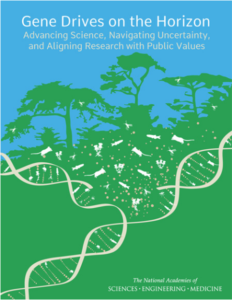
Gene Drives on the Horizon: Advancing Science, Navigating Uncertainty, and Aligning Research with Public Values
Research on gene drive systems is rapidly advancing. Many proposed applications of gene drive research aim to solve environmental and public health challenges, including the reduction of poverty and the burden of vector-borne diseases, such as malaria and dengue, which disproportionately impact low and middle income countries. However, due to their intrinsic qualities of rapid spread and irreversibility, gene drive systems raise many questions with respect to their safety relative to public and environmental health. Because gene drive systems are designed to alter the environments we share in ways that will be hard to anticipate and impossible to completely roll back, questions about the ethics surrounding use of this research are complex and will require very careful exploration.
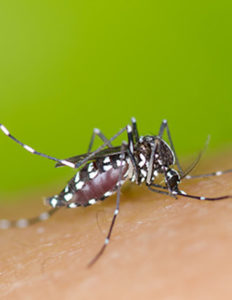
Results from the Workshop “Problem Formulation for the Use of Gene Drive in Mosquitoes”
Reducing the incidence of malaria has been a public health priority for nearly a century. New technologies and associated vector control strategies play an important role in the prospect of sustained reductions. The development of the CRISPR/Cas9 gene editing system has generated new possibilities for the use of gene-drive constructs to reduce or alter vector populations to reduce malaria incidence. However, before these technologies can be developed and exploited, it will be necessary to understand and assess the likelihood of any potential harms to humans or the environment. To begin this process, the Foundation for the National Institutes of Health and the Agriculture & Food Systems Institute organized an expert workshop to consider the potential risks related to the use of gene drives in Anopheles gambiae for malaria control in Africa. The resulting discussion yielded a series of consensus points that are reported here.

